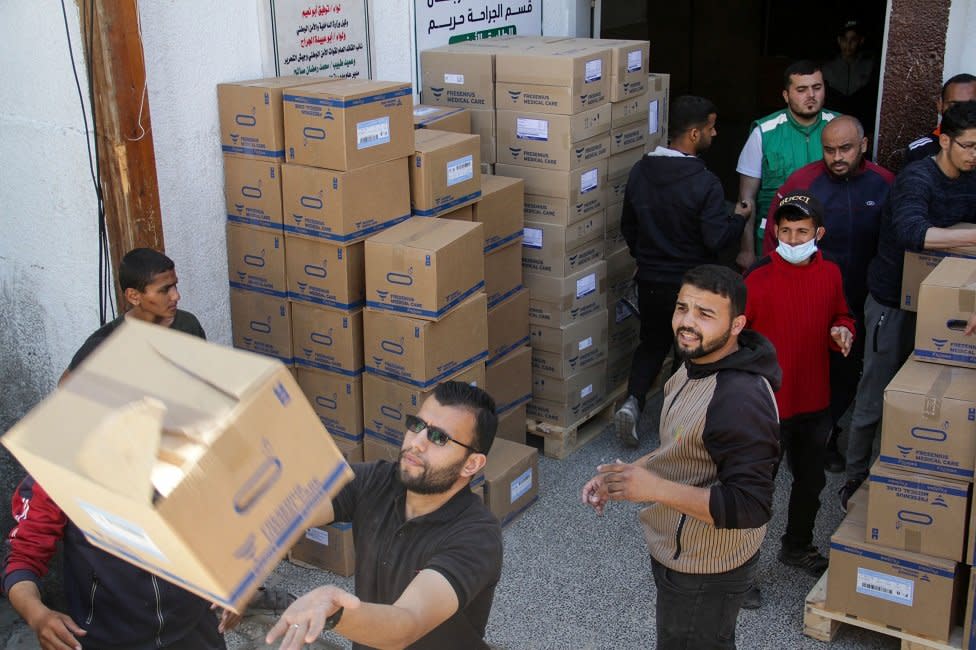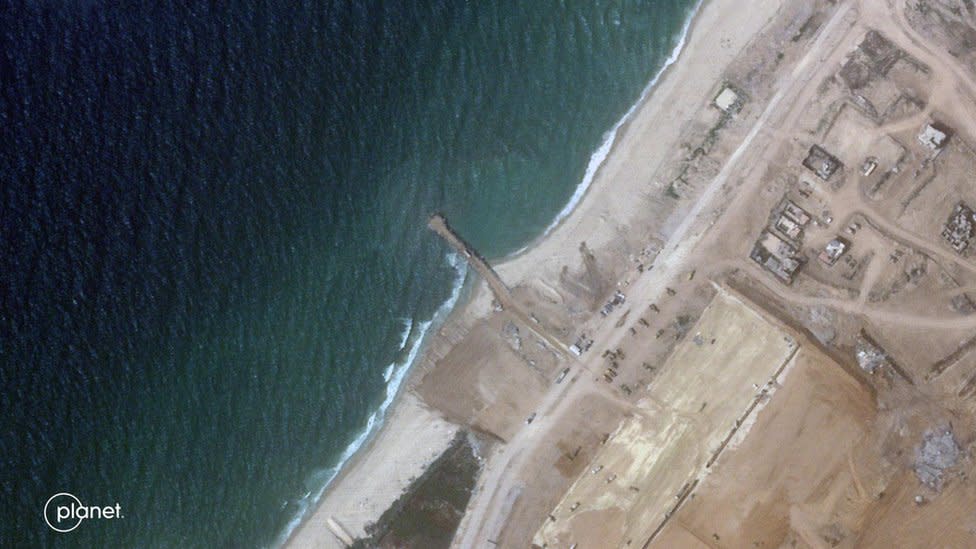UK forces may be deployed on the ground in Gaza to help deliver aid

British troops could be deployed on the ground in Gaza to help deliver aid via a new sea route, the BBC has learned.
The US has said no American forces would go ashore and an unnamed "third party" would drive trucks along a floating causeway onto the beach.
The UK is understood to be considering tasking British troops with this when the aid corridor opens next month.
Whitehall sources said no decision had been made and the issue had not yet crossed the prime minister's desk.
The Ministry of Defence (MoD) and Israeli army declined to comment.
Britain has been closely involved in planning the sea-borne aid operation and Defence Secretary Grant Shapps said the UK continued to take "a leading role in the delivery of support in coordination with the US and other international allies".
The possible role for British forces - known as "wet boots" by military planners - would see them drive trucks off landing craft onto the temporary causeway and deliver aid to a secure distribution area ashore.
Although a huge effort would be made to protect allied forces both off and onshore, British troops would potentially face a higher risk of attack from Hamas and other armed groups.
On Wednesday, a United Nations team had to take cover when mortars landed near the planned distribution zone.
US defence officials confirmed an American army ship had begun work in the eastern Mediterranean to build a large floating pier.
Aid would be delivered there from Cyprus on large ships before being transferred into trucks and smaller landing craft. They said the floating causeway would be "several hundred metres long" and anchored firmly into the sand.
They said they hoped the new maritime corridor - which they call the Joint Logistics Over-the-Shore (JLOTS) operation - would ultimately deliver up to 150 trucks per day.
IDF vows to provide security for sea aid
The aim is to add to - but not replace - aid deliveries by land that are still insufficient to meet the need. On average about 220 aid trucks per day are currently getting into Gaza by road.
The Israel Defense Forces (IDF) has said it will provide "security and logistics support for the JLOTS initiative… to enhance the entry of humanitarian aid to the Gaza Strip".
Israel's military will be responsible for anchoring the floating causeway to the beach and has been practising how to do this with American forces further north on the Israeli coast.
In a briefing with journalists, a senior US military official said because there would be no American boots on the ground, hundreds of US soldiers and sailors would live and sleep at sea on a UK naval vessel, RFA Cardigan Bay.
He also made clear US forces would not take the aid ashore and instead that role would be carried out by a "significant partner". He confirmed this would be another nation, not a private military company.
"We have a third party who will be driving the trucks down the pier," the US military official said. "Just a point of emphasis, there will be no US military boots on the ground. So, a third party is driving those trucks."
Despite questioning from journalists, he refused to name the third party.
One UK source said nothing had been decided but there was a debate going on about "do we put wet boots on the beach, do we drive trucks onto the pier?".
The MoD declined to comment about the suggestion UK forces might drive trucks ashore, but Mr Shapps said the crew of RFA Cardigan Bay were central to the UK's contribution, adding: "It is critical we establish more routes for vital humanitarian aid to reach the people of Gaza."
He said specialist British military planning teams had been embedded within the US operational HQ in Tampa, Florida - as well as in Cyprus - for several weeks to help develop the safest and most effective maritime route.
The UK Hydrographic Office has also shared analysis of the Gazan shore with US planners to develop the pier.

More than six months into Israel's military operations in the Gaza Strip, over half of its population of 2.2 million is crammed into the southern city of Rafah.
The UN has warned of a humanitarian catastrophe and Israel has faced international criticism for limiting the amount of aid reaching civilians by land.
Ziad Issa, the head of humanitarian policy at ActionAid, told BBC Radio 4's Today programme: "Any way to deliver aid to Gaza is welcome and will help a bit, but the problem with this way of delivering aid is it's going to take time and there are lots of logistical uncertainties about it."
He said it would be more efficient to allow delivery trucks into Gaza via land crossings. Trucks "loaded with tonnes of medical supplies, with food" are currently waiting to enter Gaza but are not being allowed in by Israeli forces, Mr Issa said - and aid workers are calling for Israel to permanently open a land crossing at Erez.
The Hamas-run health ministry in Gaza says more than 34,000 people have been killed in Gaza since the war began on 7 October.
The IDF launched the offensive after about 1,200 Israelis and foreigners - mostly civilians - were killed and 253 others were taken back to Gaza as hostages, according to Israeli tallies.
